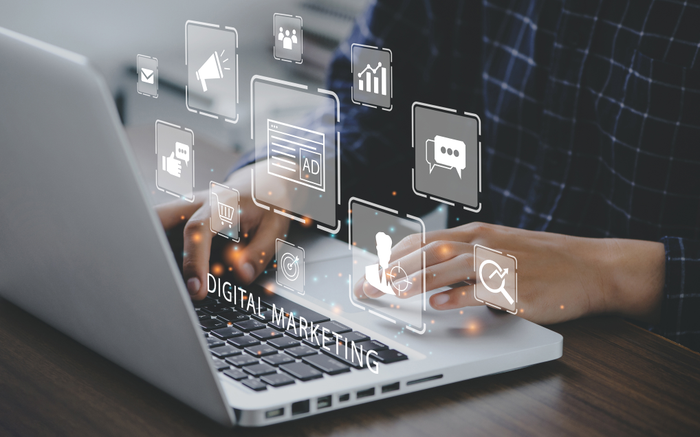If you're thinking about implementing AI in your business's marketing strategy, consider a few common uses for AI.
As a business owner, one of the easiest ways to get started with AI is in your company's marketing.
AI programs can help collect information about your customers, suggest products and services for their needs, and find the best messaging to make a sale. A recent Deloitte survey found that of businesses adopting AI, three of their top five objectives were marketing-related.
How are businesses using AI marketing?

1. Content marketing.
AI insights can help you understand what content is most effective. It can assist you in determining the best length for articles or other kinds of web content, as well as where and when it will be most effective.
In addition, AI can handle some of the more routine aspects of content creation, such as keyword selection, personalization, and categorization.
According to Forbes, Buzzfeed - one of the world’s largest content-driven sites – is an excellent example of a company that has been highly successful thanks in large part to implementing AI-driven content strategies.
2. Email marketing.
AI can also improve your email marketing's open rates, click-through rates, and overall ROI. AI-powered tools can use data from your business to optimize scheduling, personalize messages for your customers, and get your newsletter or follow-up emails past spam filters.
3. Personalized messaging.
AI can use a combination of algorithms, datasets, and machine learning to predict customers’ future behavior with predictive marketing analytics. Practically speaking, this means AI can identify products or services each customer might be interested in and when they would be most likely to make a purchase – information you can leverage to position ad campaigns and personalize recommendations for a better ROI.
4. Enhanced customer support.
AI-powered chatbots can answer frequently asked questions 24/7, helping businesses improve response time, reduce manual workload, and keep customers happy even outside business hours. Many businesses also set up automated FAQs in direct messages on platforms like Facebook and Instagram. These AI tools can guide customers to helpful information, respond to common inquiries, and even assist with order tracking — all without needing a live agent. This not only improves the customer experience but also allows business owners to stay focused on daily operations.
5. Improved data management.
AI is all about the data. While manually collecting and storing data carries the risk of human error wreaking havoc, some AI-powered tools can automate data entry and storage. In the process, AI determines whether data is valid and useable, so you can focus your time and energy on using said data to create relevant campaigns instead of just collecting it.

6. Social media marketing.
Social media marketers can also benefit greatly from AI tools. For example, you can use AI to engage in social media listening.
AI algorithms can dig through millions of data points to help you understand your customers’ sentiments and to build a more effective social media strategy based on their actions and comments. It can do all of this in real-time, meaning your social media team won’t miss a beat.
In addition, AI can help you create more compelling communications and even identify the best influencers or businesses to partner with. AI-powered tools can significantly increase your engagement on social media platforms when used to their full potential.
Where should you start implementing AI in your business's marketing plan?
- Establish clear goals. Treat AI marketing like you would any other marketing program or plan. Think about how AI can best improve your marketing efforts. Do you want to improve personalized recommendations, get more opens and click-throughs from your monthly newsletter, enhance your customer experience, or segment your audience? Whatever goals you set, establish Key Performance Indicators (KPIs) so that you can look at hard data and understand if the AI-powered tools you use are successful or not.
- Start simple. Harvard Business Review recommends taking a “stepped approach” to integrating AI into marketing plans. Try starting with simpler, rule-based applications, such as a stand-alone task automation app that can guide your customer service representatives or a chatbot for your website. After you and your employees have developed some basic AI skills and gathered valuable market data, consider investing in more complex AI-like AI-powered tools that use machine learning.
- Think about privacy standards. Before collecting and using data through AI tools, establish some privacy standards to maintain compliance with privacy laws. This will help you maintain your customers’ trust too. See BBB’s tip on creating a privacy policy for your business. Google now requires the disclosure of synthetic content that creates realistic depictions of actual events, so it's important to keep this in mind when using AI for marketing and social media use.
- Watch your budget. Research what tools can improve your marketing efforts without breaking the bank. It’s important to stay within budget, even if the goal is boosting your ROI.
- Look to reputable companies to avoid AI scams. Research a company before you purchase the AI tool they are selling. There are plenty of AI scams circulating, so you’ll want to ensure you’re dealing with a legitimate business that will handle your money and personal information appropriately. It’s also important to look for a company with a reputation for excellent customer service. After all, you’ll likely need help getting set up – especially if your business is new to AI technology.
For more information
Check out BBB's basic guidelines to consider for ethical AI usage. Read the BBB Business Tip: AI for small business. Where to start? Learn more about AI scams targeting small businesses.
